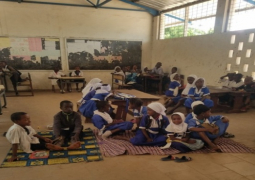
This disclosure was made on Wednesday at a presser convened by the Epidemiology and Disease Control Programme of the Ministry of Health on Neglected Tropical Diseases held at Central Medical Store, Kotu.
The mass campaign starting from 17th to 26th May, 2024, targets pre-school children (2 – 4 years and 11 months); school-aged children 5-14 years) and At-risk adults.
Schistosomiasis, a debilitating parasitic disease, continues to pose a severe threat to the health and productivity of people, particularly children and those involved in occupations with high exposure to infested water.
In his introductory remarks, Balla Jatta, programme manager Neglected Tropical Disease in the country, reminded that the initiative is part of their ongoing commitment to eliminating schistosomiasis as a public problem in line with the Global NTD Roadmap 2021-2030.
“World Health Organisation has been instrumental in making this campaign possible. Through the Merck Praziquantel Donation Programme, facilitated by the Expanded Special Programme for the Elimination of Neglected Tropical Disease (ESPEN) at WHO, AFRO and the WHO country office, we have received the necessary medicines to treat those at risk. Additionally, WHO has provided the essential funding required to support this mass drug administration.”
Schistosomiasis, he observed, remains a critical health issue in the country, disproportionately affecting children and adults exposed to infested waters.
He outlined that by targeting these vulnerable groups with preventive treatment they aim to reduce the prevalence of this debilitating disease and improve the overall health and quality of life within communities.
Dr Pius Ononigwe, Africa Centre for Disease Control and Promotion, action coordinator in The Gambia, commended the Epidemiology and Disease Control Programme of the Ministry of Health for the team work, saying WHO remains instrumental in bringing the country to this level in terms of incidence of schistosomiasis and other Neglected Tropical Diseases.
He spoke about the progress made in the reduction of NTDs and other social transmitted diseases in the country, reminding that Africa CDC is very much concerned in forging greater collaboration with institutions to reduce or even eliminate NTDs in the country.
These diseases, he went on, are preventable even though at times they are neglected.
To that end, he called on all to continue in creating more awareness to totally eliminate this disturbing disease in the country.
Taking the drugs, he believes, would significantly reduce the burden of the disease in the country, acknowledging that even though drugs might have some side effects, it is proven that its benefits far outweigh the disadvantages.
Dr Ifeanyi Udenweze, of World Health Organisation, recalled that the World Health Organisation since inception of the exercise has supported the Ministry to help reduce the prevalence rate, seen as a global health burden.
Schistosomiasis, he went on, remains a global health challenge posing a threat and affecting the health of children and even adults.
Deputising for the Director of Health Services at the Ministry, Amadou Wurry Jallow, programme coordinator Epidemiology and Disease Control at the Ministry, spoke about their resolve to achieve the ‘elimination as a public health problem’ for schistosomiasis by 2030.
The campaign, he added, is a crucial step towards mitigating the impact of this disturbing disease as aligned with the targets set by the Global NTD Roadmap 2021-2030.
Jallow reminded that their strategy involves a comprehensive approach to reach and treat every eligible individual within the specified age groups.
“The MDA campaign will be conducted through a well-coordinated effort involving our health care workers, traditional leaders and community volunteers. Distribution points will be set up in schools, health centres and other community gatherings to ensure easy accessibility and convenience for all targeted individuals.”



